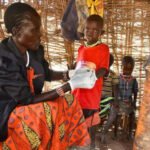Medecins Sans Frontieres (MSF), also known as Doctors Without Borders, has made moves to reduce water scarcity and recurrent diarrhoeal outbreaks in Zimbabwe‘s capital, Harare.
Through its Environmental Health Project, MSF aims to diagnose the existing boreholes with a focus on providing clean water to the beneficiaries.
The humanitarian organisation, Development Diaries gathered, also aims to understand the underlying causes of bacteriological contamination in borehole water.
SDG Six: Ensure availability and sustainable management of water and sanitation for all
Sustainable Development Goal (SDG) Six urges responsible parties to ensure the availability and sustainable management of water and sanitation for all.
In Harare, the availability of clean water has steadily decreased over the years, and there is growing concern that this will lead to increased health risks for residents.
According to the United Nations Children’s Fund (UNICEF), Zimbabwe is facing many challenges around capacity, behaviours and the lack of investment in water, sanitation and hygiene (WASH).
Reports reveal that Harare’s water treatment plant halted production in September 2019 as a result of lack of key water treatment chemicals.
The World Health Organisation (WHO) stipulates that, ideally, every person should access between 50 and 100 litres of water per day to ensure the most basic needs are met and the outbreak of disease is prevented.
With the serious shortages of water in Harare, many citizens in Zimbabwe fall short of the WHO standards.
The city has gone without drinkable water for years, a situation that has forced residents to find alternatives, many even having to turn to potentially contaminated wells and boreholes.
According to MSF, people living near dysfunctional or damaged boreholes had to organise their schedules and lives around reaching other water sources in order to get clean potable water.
This means poor families have to walk far distances, pay money to access water points on a daily basis, or wake as early as 2am each day to collect water.
Source: Allafrica
Photo source: UNICEF




